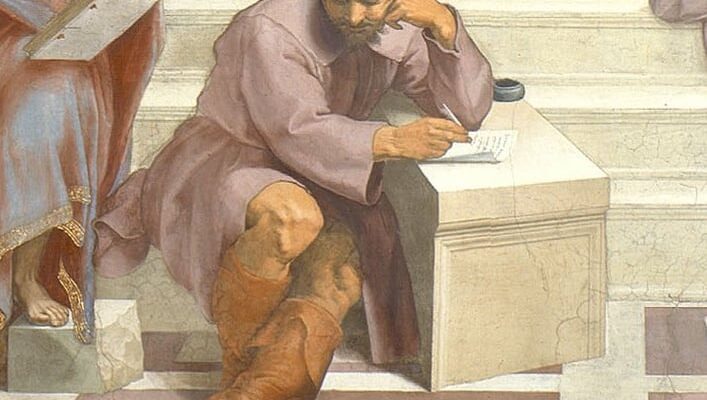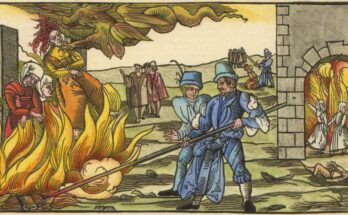
Heraclitus, the great and obscure Ephesian philosopher, has been influential for many great minds throughout history, yet few people are truly aware of the elements of his philosophy, including his views on the afterlife.
Although his written works have not survived to the present day, we may glean some insight into his ideas by later writers’ references to Heraclitus. Nonetheless, we must keep in mind that we cannot claim to fully comprehend his works, as Heraclitus was famous for his deliberate “obscurity” even in antiquity.
Life and background: The Ephesus of Heraclitus
Heraclitus, who lived from 535 to c. 475 BC, was an Ionian philosopher from the city of Ephesus, the second-largest city in Ionia. He was the son of Bloso and belonged to the family of the Androcleids—those who, under the leadership of Androcles, son of the Athenian King Codrus, left Athens and founded Ephesus in Ionia (Asia Minor).
Diogenes mentions that Heraclitus abdicated the kingship in favor of his brother, and Strabo affirms that a ruling family in Ephesus, descended from Androcles, still held titles, had a prominent place in the games, and enjoyed certain privileges.
Ephesus was part of the Persian Empire since 547 BC and a satrap ruled them. The Great King, however, allowed the Ionians considerable autonomy. Diogenes writes that Heraclitus used to play knucklebone (astragalos) with the youths in the temple of Artemis. When asked to make laws, he refused, stating that he would “keep the wicked state in the city,” meaning that depravity had prevailed.
Ephesus was admired even in his childhood. He had no formal teacher and claimed to have learned everything independently. From the surviving fragments of his work, we see that he was familiar with the writings of earlier philosophers, the epic and elegiac poets, and the historical texts circulating in Ionia at his time.
Strong-willed, heretical, and arrogant, Heraclitus seemingly passed all his wealth to his younger brother. He characterized his fellow citizens as worthless and corrupt and burned those writings of his that were difficult to follow. He eventually retreated to the wilderness during the establishment of the Republic of Ephesus. His personal life became intertwined with the world-historical changes of Ionia. This was despite the fact that he remained a self-taught, self-defined philosopher, devoted to exploring indeterminacy and perpetual motion.
Philosophical beliefs and political Involvement
The tyrannical polities of the Ionian cities abruptly shifted to democratic forms, and chaos seemed to prevail in Ephesus. Heraclitus was working there, an incomprehensible and enigmatic philosopher. He initially accepted but later exploded in anger following the popular movement and its tragic aftermath (the destruction of Miletus by the Persians).
The breaking point came when the Ephesians banished his friend Hermodorus. “So that they may all be equal at bottom,” as he protested. Enraged by the behavior of his fellow citizens, Heraclitus had no qualms about reprimanding them. Indeed, he seemed to hold a lifelong contempt for people. This attitude is evident in surviving passages in which he critiques the political morals of the Ionians.
Heraclitus, being of aristocratic origin, opposed both democracy and tyranny. He likely played an active role in the political struggles of his homeland. Naturally, he sided with the aristocracy and condemned the principle of equality.
As he wrote: “One is ten thousand to me, if he be extraordinary.” His political activity apparently began around 510–500 BC in the years leading up to the Ionian Revolt. The pro-Persian rule of the tyrants of Ephesus, Aristagoras and Komas, came to an unexpected end, and democracy rose.
Heraclitus tried to prevent extreme outcomes in his homeland, as had happened in other Ionian cities. He considered his friend Hermodorus the most worthy of leading the newly founded republic, but the city exiled him from Ephesus. After this, Heraclitus suddenly cut ties with the city and its inhabitants, accusing them of tyranny.
Illness, death, and legacy: The enigmatic end of Heraclitus
Afterward, he took refuge in the mountains, surviving on grasses and herbs, but he eventually fell seriously ill. It seems that during this time, Ephesus suffered from dropsy, which manifested as abdominal swelling. When he returned to Ephesus, in poor condition, he blamed the unphilosophical doctors and attempted to heal himself. Aware that death was imminent, he tried to treat his condition based on his thermodynamic belief in the “eternal fire.” He placed warm pads on his swollen belly, hoping to preserve his inner fire.
When people later found him dead in the mountains (or in a cowshed, according to another version), they said that he had covered himself in dung to stay warm. Others claimed that wild animals had torn his flesh. Some suggested that someone buried his body in sand. He was certainly a philosopher obscure in both death and life.
The cosmology of the four elements
In order to understand Heraclitus’ views on the afterlife, we must first examine his cosmology. Ancient accounts agree that Heraclitus’ cosmology bears significant similarities to that of the Stoic philosophers. As Simplicius explains:
“According to Heraclitus, the world undergoes periodic conflagration and, at other times, is recreated from fire in a cyclical manner. As he himself states, ‘according to the eternal order, it lights, and according to the eternal order, it burns out.’ This idea was later adopted by the Stoics.”
Most ancient Greek philosophers, including Heraclitus, identified four principal elements in the universe: fire, air, water, and earth. We must not understand these elements only in their everyday sense but primarily according to their “qualities.”
For example, whatever in this world possesses “heaviness, stability, and gravity”—in other words, what we call “stable”— they regarded it as “earth.” Whatever is fluid, they called “water” while “air” was synonymous with what modern science calls “space.” Anything that caused heat or visibility—what modern physicists call “plasma”—was regarded as “fire,” equivalent to “light.”
The difference between heavenly and earthly fire
However, philosophers often distinguished between earthly air and heavenly air. They believed that earthly air was mixed with elements of water (fluid elements). On the other hand, heavenly air was supposed to be pure and free from earthly contamination. This is why they called the heavenly space “ether” (a Greek word meaning “clean air”).
Many philosophers, including Heraclitus, believed that “fire” was the predominant element in the ether. However, there was a difference between fire in the heavens and fire on earth. As Proclus explains:
“For the celestial fire is not caustic, but, I would say, vivifying. Much like the heat that is naturally inherent in us. Aristotle, in his Generation of Animals, also says that there is a certain illumination from which all mortal nature lives. All of heaven, therefore, consists of this kind of fire. This element composes most of the stars, though they also contain the summits of other elements.
Moreover, if we consider that earth darkens all illuminating natures and produces shadow, while the elements between earth and fire, being naturally transparent, are recipients of both darkness and light without being causes of either, we can see that fire alone supplies light, just as earth supplies darkness. Since fire and earth are at the greatest distance from each other, we may understand how the celestial bodies are of a fiery nature. It is clear that they illuminate in the same way as our sublunary fire. If this characteristic is common to both, it is evident that the fire here on earth is related to the fire of the celestial bodies. Thus, it is not appropriate to introduce a celestial nature foreign to the universe. Instead, we should acknowledge that the elements on earth are connected to the nature of the celestial orbs.”
The Eternal Fire is Zeus, the creator
This is a view Heraclitus shared, believing that all the elements and the entire universe derive their subsistence from this celestial fire. He referred to this fire as “Zeus,” God, or even Time. According to him, everything, including gods and mortals, exists because of this element. As he writes in a fragment: “God is day and night, winter and summer; war and peace, satiety and hunger; he takes various shapes just as fire does.” He also states, “This [god as fire] is both willing and unwilling to be called by the name Zeus.”
Heraclitus viewed the whole universe as dependent on the “logos” of this fiery element. Logos is equivalent to what we might call “Fate” (Emarmene), the natural laws through which the Fire-God determines every event in the universe. He did not consider the elements, including fire, and nature as soulless but rather as living entities with both Soul and Intellect. This is why he says, “The world is made not according to time but according to thought.”
Fire as arche: Non-being and being are identical
Since fire is the arche—the fundamental substance of the world—and everything derives from it, he believed that even opposites share the same essence. He stated: “God is day and night, winter and summer, war and peace, satiety and hunger. He takes various shapes just as fire does.”
This is because “everything flows,” according to Aristotle. Heraclitus also claimed that “being and non-being are identical.” This belief is why he viewed everything, whether deemed Good or Evil, as ultimately Good by the will of God. He believed that the senses deceive us about the true essence and nature of the universe. This view would later on inspire Plato. Heraclitus also compared time to a child playing, saying: “Time is a child playing a game of draughts. The kingship is in the hands of a child.”
The universe is eternal
Since everything derives its birth from fire, and fire is eternal, Heraclitus saw the universe as eternal and one that was not “created” by any specific entity. Nonetheless, because everything originates from the eternal fire, the birth of the other elements of nature Heraclitus viewed as “death.”
As he explains:
“This universe, which is the same for all, has not been made by any god or man, but it always has been, is, and will be, an ever-living Fire, kindling itself by regular measures and going out by regular measures. It throws apart and then brings together again; it advances and retires. The transformations of Fire are: first, sea; and of sea, half becomes earth and half prester. Fire lives in the death of earth, air in the death of Fire, water in the death of air, and earth in the death of water. The thunderbolt pilots all things.”
Thus, the entire universe exists through death and conflict. This helps us make sense of his famous phrase that “war is the father of all things.” It can also help us understand his concept of the harmony of opposites.
Humans are of a divine nature
Heraclitus’ theory, by which the birth of one element is the death of another, can also help us understand his views on the afterlife for humans. For Heraclitus, human souls are part of the eternal fire element, and thus, humans partake in the divine logos. He viewed humans as being closest in nature to God.
This is why he stated: “Men are mortal gods, and gods are immortal men.” Influenced by the mysteries of Eleusis, he believed that this life is a kind of death. He believed that: “Death is all things we see awake; all we see asleep is sleep.” We all hold fiery, divine souls within us, but they are experiencing “death.” That is insofar as they are separate from their unified fiery nature.
In other words, we are all united by a common nature, and one soul can be the soul of another. If one dies, the fiery part, can give birth to another human being. This idea he expresses in the following words: “Immortals are mortal, mortals are immortal. Living, they have their death, but having died, they have their life.”
“In us, the living and the dead, wakefulness and sleep, youth and old age, are one and the same: for the one changes into the other, and reciprocally,” it was said. Heraclitus believed in the cyclical recurrence of all things, including our lives in the afterlife. If we also believe Hippolytus, Heraclitus may have believed that a form of resurrection could occur.
Humans are living their death in this life
Since the birth of the other elements, including earthly life, is our life as humans, our fiery element in it “dies.” However, fire, according to Heraclitus, is our true essence and the one that shall subsist in the afterlife. Since everything derives from fire and fire is the eternal element, this implies that fire is our true immortal nature.
Nevertheless, its contrary element, “water,” would be its death. Water is the element most dominant in the earthly world, and Heraclitus would even identify it with “Dionysus.” He says: “For it is death for souls to become water, and death to water to become earth.” Since water unites the earthly and fiery elements, this is a reference to our human lives. Heraclitus claims that a wise man who is “awake” must realize that we do not live in separate worlds but in one common world, because everything is fire.
As he says: “He who hears not me but the logos will say: All is one.” And further: “To those who are awake, there is one world in common, but to those who are asleep, each is withdrawn to a private world of his own.”
Is there hope for the human afterlife according to Heraclitus?
The more one realizes that the nature of our world is unified, the less he will be drawn into the “watery” passions of this world. By avoiding a subjective life and thoughts, his soul will remain “dry” and in harmony with its fiery divine nature.
Olympiodorus, with regards to Heraclitus’ view on the afterlife says: “The soul of the wise, tempered by the virtues, survives until the universal conflagration, which was the opinion, for example, of Heraclitus.”
In the end, Heraclitus offers hope for the afterlife of those who die bravely: “Gods and men honor those slain in battle.” He also claims that “greater deaths win greater portions.” In this, Heraclitus aligns with Plato, who also believed that those slain in battle should be honored as divine men, similar to those of the Golden Age described by Hesiod in their afterlife.
Ultimately, being the obscure philosopher that he was, Heraclitus leaves us in obscurity regarding what awaits us if our souls make it to the afterlife. He states: “There awaits men when they die such things as they look not for nor dream of.”



